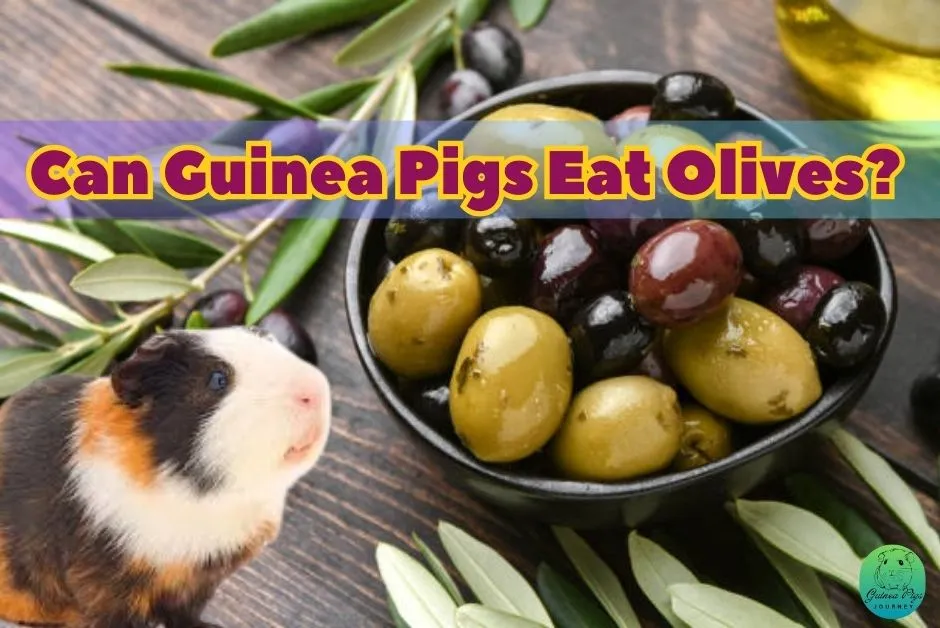Olives are small, crunchy fruits that grow on olive trees (Olea europaea). They belong to a group of fruits called drupes, or stone fruits, and are related to nectarines, plums, mangoes, cherries, almonds, and pistachios. Some immature olives are green and turn black when they ripen and 90% of olives are used to make olive oil in the Mediterranean region. Others remain green even when fully ripe. Olives are very high in vitamin E, iron, Calcium, sodium, and other powerful antioxidants but having little furry friends like guinea pigs makes you responsible and a question comes to mind can guinea pigs eat olives? Or Can I give my guinea pig olive oil?
The answer is definitely, NO! Guinea pigs should not be fed with olives or olive oils high in sodium, calcium, fats, carbohydrates, or a little acidic which can cause digestive issues such as diarrhea, bloating, gastric upset, and vomiting. A diet high in sodium and fat can cause serious health problems such as obesity and urinary tract infections and olives are the fruit for guinea pigs high in sodium and fat. Olives undergo an extensive process involving cooking, coloring (particularly black ones), preservation, and fermentation or curing with lye, brine water, syrups, or acidic salt.
Let’s quickly go through this guinea pig journey to explore more about olives for guinea pigs for their safety and healthy life. Guinea pigs have sensitive digestive systems and require great care when offering any new food like olives in their diet and an owner must know about all the considerations, risks, facts, and reactions of olives for guinea pigs.
Is Olive Safe For Guinea Pigs?
Olives are not toxic for guinea pigs but are not a suitable option to include in their diet as well due to their nutritional properties containing high amounts of sodium, calcium, fats, carbohydrates, and low amounts of vitamin C and other important nutrients for guinea pigs. Studies have found olives with numerous health benefits such as being good for the heart and protecting against osteoporosis and cancer. But olives for guinea pigs are not a healthy choice, it can cause many health issues and upset their digestive health.
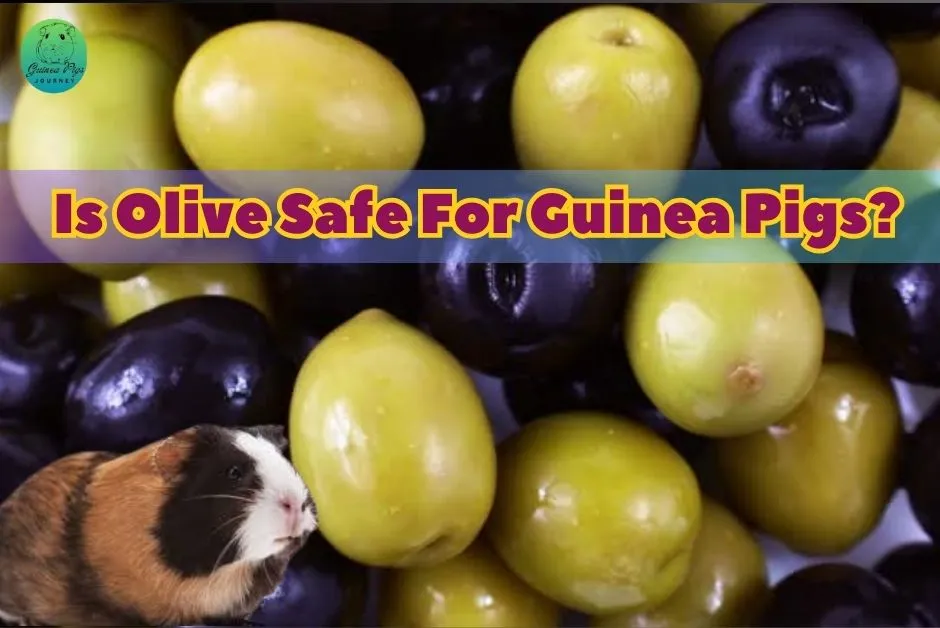
You would find many online sources about feeding olives to guinea pigs, some would suggest yes and some with no to feed olives to your guinea pigs, creating doubt and confusion about olives for guinea pigs. So, it is always advised that if you are in doubt then it is best to leave or avoid it and the same goes for olives for guinea pigs.
This long guinea pig journey and experience with my little furry friends have taught me to live by the rule of “if you are not sure about any new food for guinea pigs, then do not feed them to be on the safe side” until you do a thorough research and ask your vet about that specific food for guinea pigs safety and healthy life.
One of the main reasons for avoiding olives is the quantity of vitamin C which your guinea pigs cannot synthesize. Guinea pigs require 30-50 mg of Vitamin C daily in their diet very crucially for immune boosting, wound healing, collagen biosynthesis, and bone growth. Whereas, olives have very little quantity of vitamin C in regards to high in sodium, calcium, and fats. So there are many other healthy alternatives to opt for your guinea pigs’ optimum nutritional requirements.
Even though the fact, olives are not mentioned in any toxic food list for guinea pigs, but also are not on any recommended food list as well. So, this could be the reason that being a responsible and caring owner, we should go on the safe side and avoid offering olives to guinea pigs.
Nutritional Requirements of Guinea Pigs:
Guinea pigs have a very delicate and sensitive digestive system which makes a responsible owner understand the sensitivity of selecting any new food for their furry friend as all foods are not edible and some foods are toxic and bad for guinea pigs’ digestive and overall health such as jalapenos, cheerios, pickles, meat, etc. So, ensuring the recommended and best diet for guinea pigs is very important by applying the best ways to feed guinea pigs.
In general, Guinea pigs require good quality hay which makes up 80-90 % of most of their diet along with 10 % of fresh and good quality vegetables, leafy greens, and fruits such as Sugar snap peas, arugula, asparagus, beets, bell peppers, butternut squash, wheat grass, dragon fruit, dandelions, green beans, pumpkin seeds, Swiss chard, zucchini etc. as an occasional treat in moderation.
Guinea pigs can also be served with some amount of only dedicated guinea pig pallets but it should not be part of their main staple and should be served the recommended portion or mentioned on pallets bag for guinea pigs. Guinea pigs should also be served with fresh, clean, chlorine-free drinking water at all times and must be checked and changed twice a day for their good health.
Nutritional Analysis of Olives for Guinea Pigs:
It is paramount always to understand the nutritional requirements of a pet like a guinea pig having a unique digestive system to prevent common issues and support their overall health. According to the USDA Food Database, listed below are the nutritional values and percentages per 100 grams of Olives for guinea pigs. Let’s first analyze the nutritional values of both black and green olives to understand whether olives for guinea pigs are good from a nutritional standpoint.
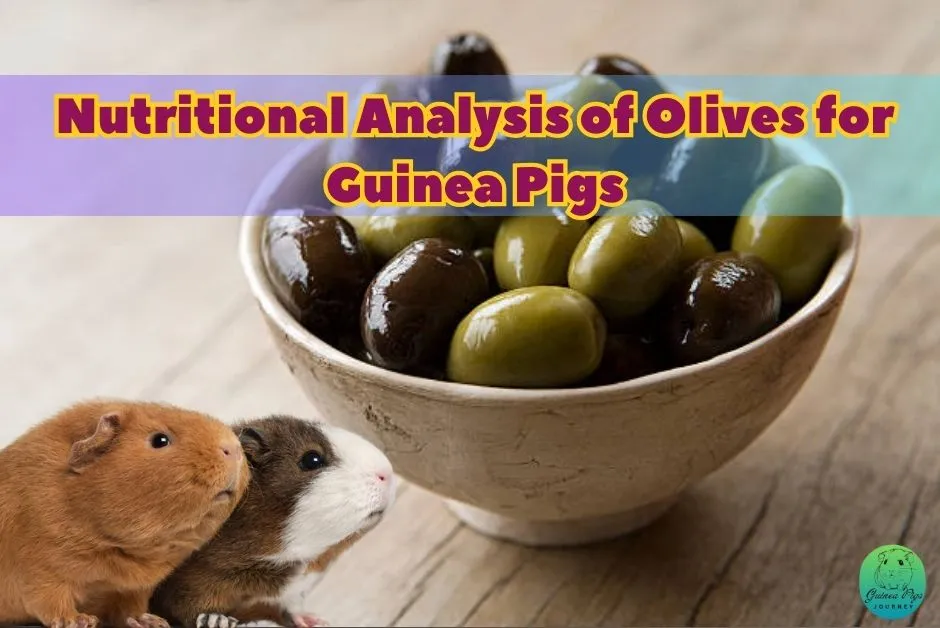
| Nutrients | Green Olives per 100 grams | Black Olives per 100 grams |
| Energy / Calories | 145 kcal | 116 kcal |
| Carbohydrates | 3.84 grams | 6.04 grams |
| Water | 75.3 grams | 80 grams |
| Fat | 15.3 grams | 11 grams |
| Protein | 1.03 grams | 0.84 grams |
| Dietary Fiber | 3.3 gram | 1.6 gram |
| Sugar | 0.54 grams | 0 grams |
| Net Crabs | 0.54 grams | 4.44 grams |
| Vitamin C, total ascorbic acid | 0 mg | 0.9 mg |
| Vitamin K | 1.4 µg | 1.4 µg |
| Vitamin A, RAE | 20 µg | 17 µg |
| Vitamin B-6 | 0.031 mg | 0.009 mg |
| Vitamin D | 0 mg | 3.6 mg |
| Cholesterol | 0 mg | 0 mg |
| Fatty Acid (Saturated) | 2.03 grams | 2.28 grams |
| Calcium, Ca | 52 mg | 88 mg |
| Phosphorus, P | 4 mg | 3 mg |
| Potassium, K | 42 mg | 8 mg |
| Iron, Fe | 0.49 mg | 6.28 mg |
| Magnesium, Mg | 11 mg | 4 mg |
| Zinc, Zn | 0.04 mg | 0.22 mg |
| Sodium, Na | 1560 mg | 735 mg |
| Folate | 3 µg | 0 µg |
After analyzing the nutritional values per 10 grams of olives for guinea pigs, now it is clear that olives contain high calories, fats, carbohydrates, sodium, and calcium which are not safe for guinea pigs’ overall health as their digestive system is so sensitive to they cannot go well with a diet high in carbohydrate, fat, calcium, sodium, and calories.
Important to note is the value of vitamin C is almost 0 mg per 100 grams which means it is not the wish list food for guinea pigs. Calcium is very dangerous in excess amounts contributing to kidney and bladder stones whereas sodium can cause. Studies also suggested that high sodium content in foods can be risky and harmful for guinea pigs leading to stomach and esophageal cancer if fed to them in excess amounts.
So, always stick to fresh, organically produced, and raw leafy greens, vegetables, and fruits to make a good source of nutritional standpoint for guinea pigs.
What Are The Risks Of Feeding Olives To Guinea Pigs?
As we know now olives for guinea pigs are not a suitable fruit to offer and contain many health-related issues for them. It is also very important to know the factors and risks associated with the nutrients that affect the health of your guinea pigs if you feed them olives. Let’s, explore some risks of olives for guinea pigs.
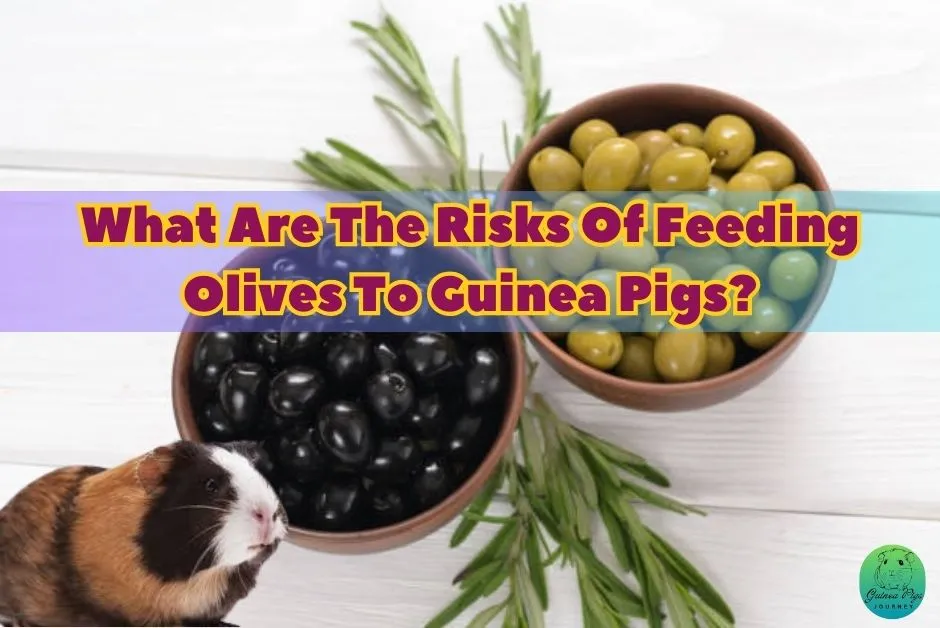
High Sodium Content:
Olives for guinea pigs are comparatively too high i.e. almost 1560 mg green olives and 765 mg black olives per 100 grams of serving which means the sodium in olives for guinea pigs can be harmful if fed in excess contributing to stomach and esophageal cancer as well as production of bladder stones, or hard mineral masses in the bladder that can lead to blood in urine which can cause frequent urination and abdominal pain as well. So it is important to avoid feeding olives to your guinea pigs if you are already serving them and stick to their natural and recommended diet plan.
Sodium in excess amount can also cause bloating, thirst, or water retention that can make your guinea pigs ill and cause health issues.
Acidic Reflux:
Olives for guinea pigs can be acidic which can contribute to acidic reflux and your guinea pigs may feel appetite and avoid eating other suitable food.
Risk of Cancer:
Olives for guinea pigs as well as humans also contain Acrylamide that forms during processing which is linked to an increased risk of cancer in some studies. Ripe black olives are more prone to contain a high amount of acrylamide as a result of processing.
Formation of Kidney and Bladder Stone:
Olives for guinea pigs are high in calcium and contain almost 52 and 88 mg of 100-gram serving of green and black olives respectively which is too much amount in excessive feeding for guinea pigs contributing to the formation of bladder and kidney stones due to calcium oxalate leading to very painful conditions, renal failure, urinary tract issues, and surgical procedures to remove the stones. So, avoid feeding the olives to your guinea pigs if you give them as an occasional treat.
Obesity and Weight Gain:
Olives for guinea pigs are highly fattening i.e. almost 15.3 grams of green olives per 100 grams serving making them an unhealthy option for guinea pigs contributing to weight gain and obesity subsequently leading to many health-related issues.
Digestive Upset:
Guinea pigs have a very delicate digestive system and require very care and responsible feeding. Olives for guinea pigs are also high in preservatives and added ingredients like syrup, salt, brine water, sugar, etc. which can cause serious digestive issues like diarrhea, gastrointestinal upset, vomiting, bloating, loose stool, flatulence, gastric issues, etc. So avoid feeding olives that can be very bad for your guinea pigs’ overall health.
Nutritional Deficiencies:
Guinea pigs require some important nutrients, minerals, and vitamins such as Vitamin C, A, K, potassium, phosphorus, Iron, etc. to live a healthy and long span life but olives for guinea pigs are not that much nutritional food, the amount vitamin C in olives is almost zero or very less quantity which means guinea pigs daily requirement of vitamin C I.e. almost 30-50 mg per day cannot be fulfilled with olives. So I would recommend you stop feeding olives and offer them some alternatives such as Grapefruit, pomegranate, honeydew melon, pears, plums, etc. to keep them healthy and fit.
Choking Hazards:
Olive’s pits are so hard that can cause choking hazards for your guinea pigs that may also lead to digestive blockage and subsequent bloating and respiratory issues. So, if you want to avoid choking hazards then it is best to avoid olives for guinea pigs.
Allergic Reactions:
Olive tree has some elements known as pollen which means allergies to olives are common and cause allergic reactions after eating by humans or feeding your guinea pigs. Allergic reactions in the mouth or throat and itching are rare. So it is very crucial to monitor your guinea pigs while offering any new food including olives for guinea pigs and best to avoid olives to keep your guinea pigs healthy and fit.
Can Guinea Pigs Eat Green Olives?
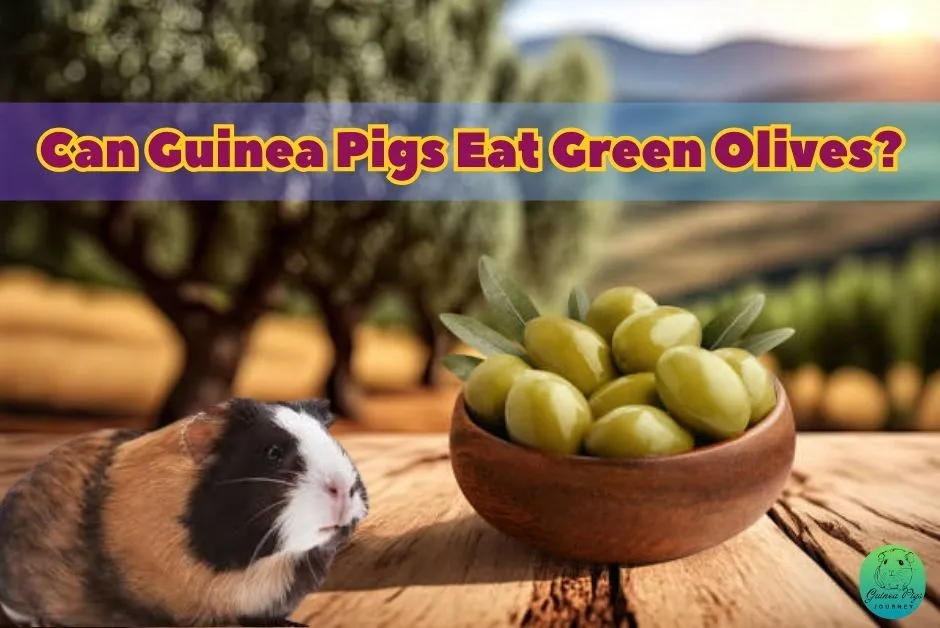
No, it is not recommended to feed green olives to your guinea pigs as they are very high in fats, calcium, and sodium content which can cause serious digestive and health issues making your guinea pigs ill. In fact, green olives have much more sodium and fat content than black olives making them unsuitable and unhealthy options for guinea pigs. It is best to avoid green olives for the safety and healthy life of your guinea pigs.
Can Guinea Pigs Eat Black Olives?
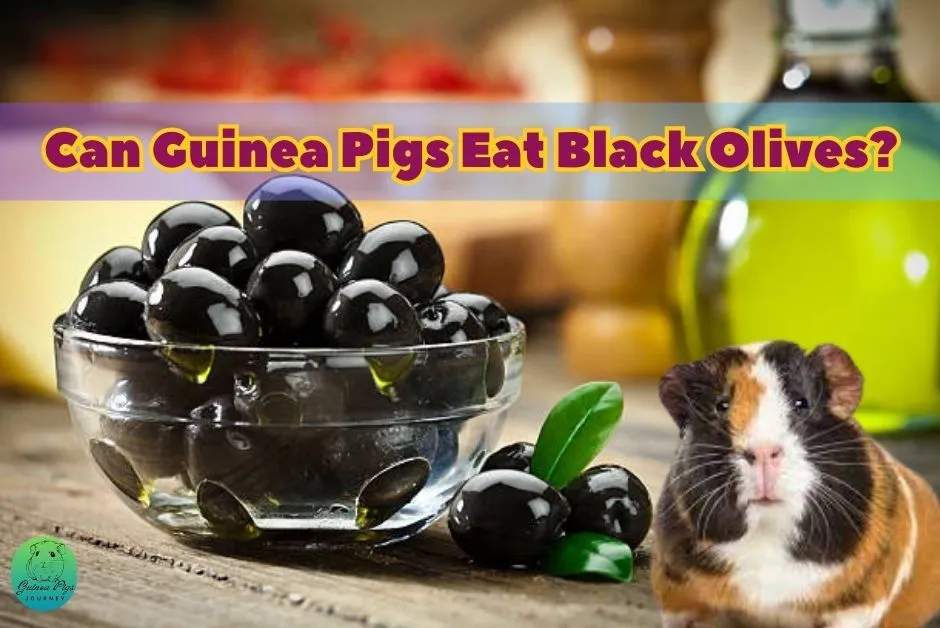
No, Black olives for guinea pigs are not recommended to feed which can cause serious digestive and health issues just like green olives such as kidney or bladder stones, stomach upset, diarrhea, etc. Black olives have much more calcium content than green olives as well as a high amount of Acrylamide as a result of processing which can increase the risk of cancer for your guinea pigs. So, avoid feeding black olives to your guinea pigs.
Can Guinea Pigs Eat Olives Oil?
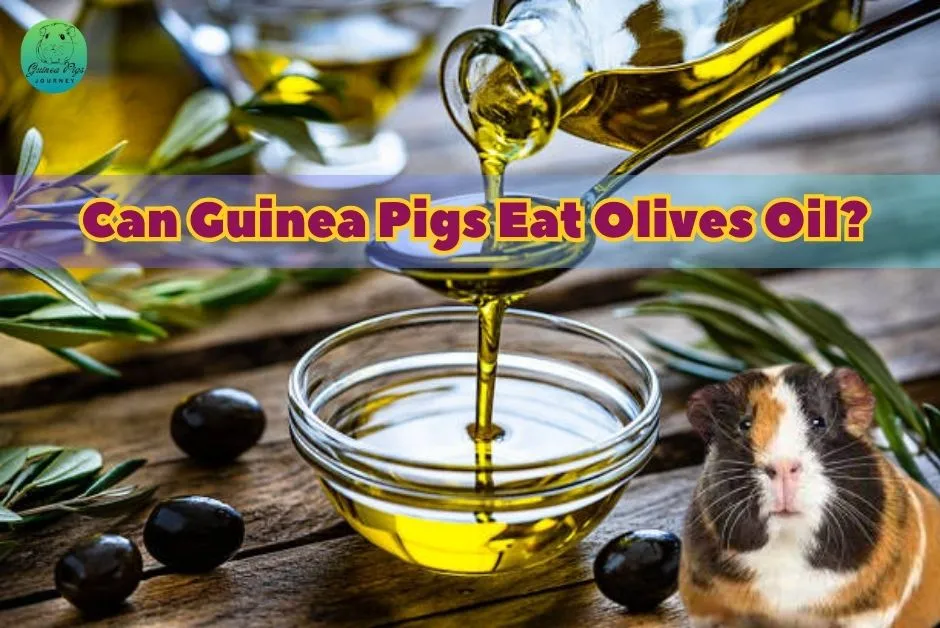
No, olive oil is not recommended to feed your guinea pigs as it can cause digestive upset and serious health issues in guinea pigs and guinea pigs do not go well with oil or food mixed with oil. Olives are also sometimes coated with garlic, seasonings, beverages, alcohol, or oil carrying additional risks as these substitutes mentioned are not recommended for your furry friends.
Can Guinea Pigs Eat Olives Tree Oil?
No, not at all, olive tree oil is not recommended to feed your guinea pigs as olive trees contain traces of pollen which causes allergic reactions in humans and pets. So, olive tree oil is not a good option for your guinea pig which can also cause serious health issues and digestive upset.
Can Guinea Pigs Eat Olives Leaves?
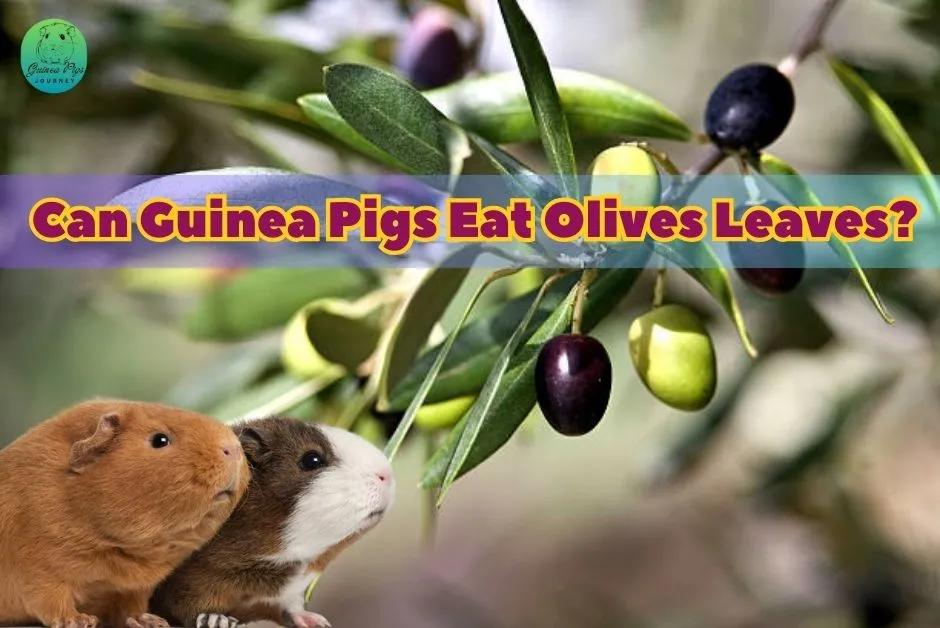
No, olive leaves are not recommended to feed your guinea pig as they can be allergic to your guinea pigs and your guinea pigs are very hypersensitive to allergic reactions to olive leaves, or related plants. It is important to avoid olive leaves especially for pregnant guinea pigs as it can be dangerous for them and baby guinea pigs.
Can Guinea Pigs Eat Canned Olives?
No, canned olives are even more dangerous for your guinea pigs because they contain some preservatives such as salt, acidic water or brine water, syrups, chemicals, etc which makes it more salty and means sodium content is increased even more which can contribute to serious digestive upset and health problems like diarrhea, bloating, vomiting, gastrointestinal upset, etc. So, it is recommended to go for healthy and raw fresh vegetables and fruits rather than olives of any type.
Can Guinea Pigs Eat Pickled Olives?
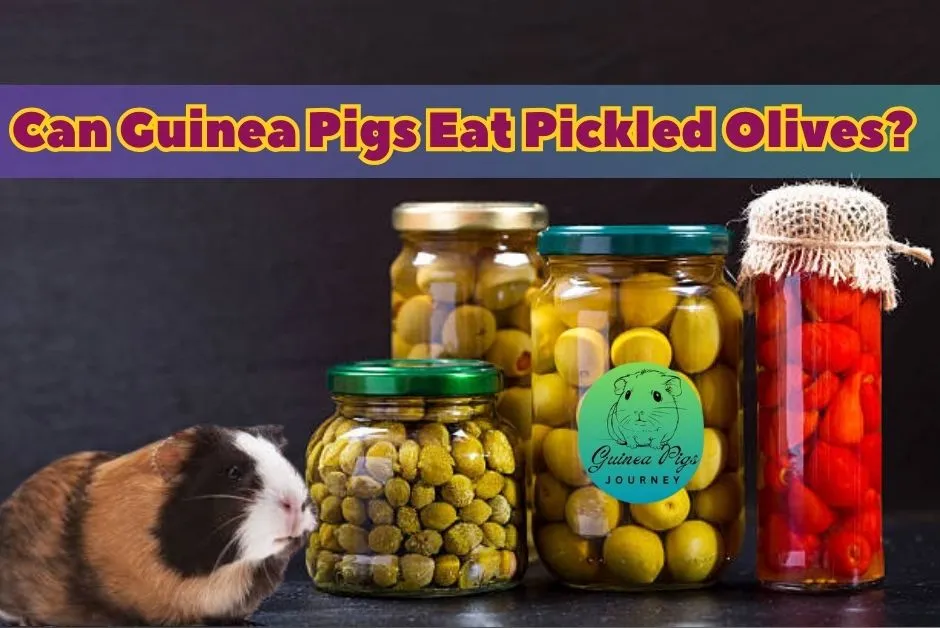
No, pickled olives are very dangerous for guinea pigs and not recommended to feed your guinea pigs, even any food pickled in less quantity is not recommended to offer your guinea pigs. Pickled olives are often high in sodium and contain vinegar, spices, acid, and salt which can be unhealthy and harmful to guinea pig’s health. Pickles high in salt and acid can cause serious digestive issues including bloating, stomach ache or upset, high blood pressure, diarrhea, vomiting, acid reflux, kidney pain, etc.
Can Guinea Pigs Eat Frozen Olives?
No, not to mention frozen olives, raw olives are also not recommended to feed your guinea pigs as they cause many health issues and digestive upset for your guinea pigs. So, it is best to stick to raw and fresh veggies and fruits.
Alternatives of Olives for Guinea Pigs:
Guinea pigs are very sensitive pets and need great care. There are many healthy alternatives that you can offer your guinea pig as an alternative to olives for guinea pigs. These foods provide nutrient-rich elements like vitamins C, K, and A, potassium, Iron, etc. and olives have little or no quantity that can boost your health in many ways of your Guinea pigs. Here are some good alternatives or veggies in raw to consider when preparing a salad in moderation for your cavies;
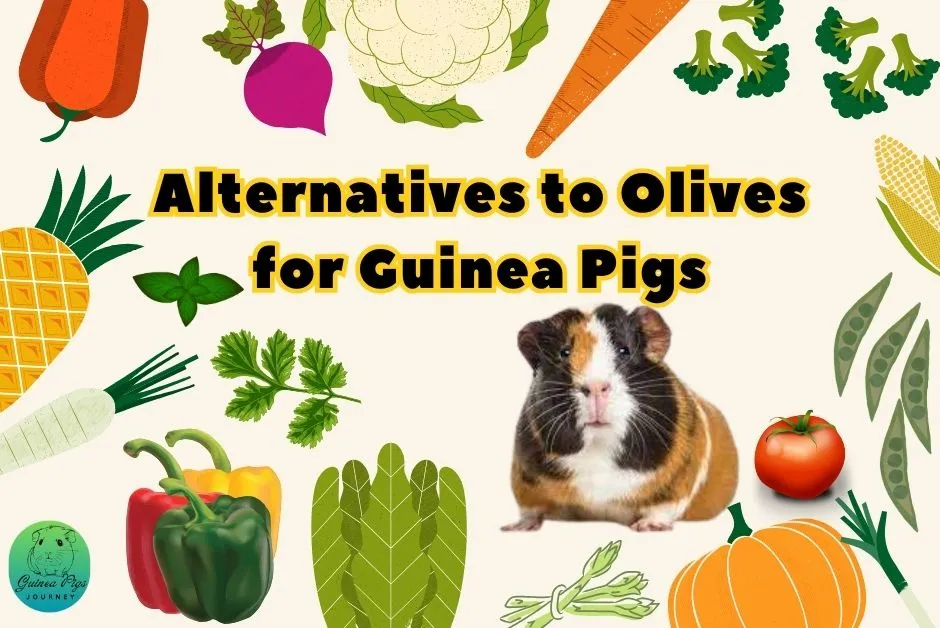
Guinea pigs’ nutritional requirements can also be achieved through some safe Leafy greens and vegetables which can be served as a treat in their diet once a day or several times a week. Some foods rich in healthy nutrients include Broccoli, Asparagus, cilantro, Rosemary, basil, Bell peppers, Jicama, mustard greens, Mushrooms, and some citrus fruits like orange or grapefruit, nectarines, blackberries that can boost the requirement of vitamin C for guinea pigs if fed in moderation. It is recommended to keep the portion and size of serving small since fruits are rich in sugar content that can be harmful if fed excessively to guinea pigs and cause several health risks for guinea pigs.
Conclusion: Olives for Guinea Pigs
Overall, Olives for guinea pigs are not safe food and can cause serious digestive and health issues because they are high in salt, sodium, calcium, and fats as well as highly processed and mixed with brine water or salt water foods with added sugar, chemicals, and preservatives. Although olives are not toxic, long-term feeding olives to your guinea pigs can be dangerous causing stomach upset, bladder or kidney stones, allergic reactions, and other health issues. So, stick to fresh, raw, and organically produced hay, vegetables, leafy greens, and fruits in moderation. I always recommend consulting with your vet for the best guidance and how to introduce any new food for the safety of your guinea pigs.

